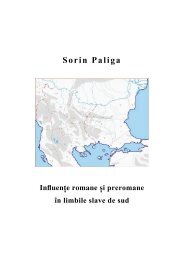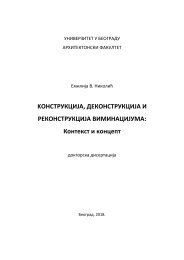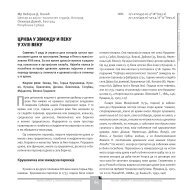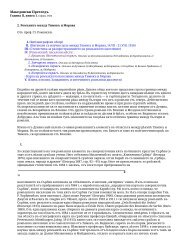The Construction of National Identity and its Challenges in Post-Yugoslav Censuses
Create successful ePaper yourself
Turn your PDF publications into a flip-book with our unique Google optimized e-Paper software.
<strong>The</strong> <strong>Construction</strong> <strong>of</strong> <strong>National</strong> <strong>Identity</strong> <strong>and</strong> <strong>its</strong> <strong>Challenges</strong> 891<br />
As such, censuses are elementary moments <strong>of</strong> group mak<strong>in</strong>g, <strong>and</strong> an opportunity for<br />
ethnic entrepreneurs to assert <strong>and</strong> def<strong>in</strong>e groupness (Brubaker, 2004:7–20). Thus, <strong>in</strong> addition<br />
to the arena <strong>of</strong> contention between state <strong>and</strong> m<strong>in</strong>orities, censuses are fundamentally<br />
about citizens <strong>and</strong> how they respond to the different dem<strong>and</strong>s, categories, <strong>and</strong> pressures.<br />
Individual <strong>Challenges</strong> to Ethno-<strong>National</strong> <strong>Identity</strong><br />
<strong>The</strong> f<strong>in</strong>al aspect <strong>of</strong> the census as a site where identities are negotiated is the response <strong>of</strong><br />
citizens. Here, we are <strong>in</strong>terested <strong>in</strong> citizens who fail to identify themselves along the l<strong>in</strong>es<br />
prescribed by the states <strong>and</strong> ethnic entrepreneurs. While categories, as noted above, are<br />
suggestive <strong>and</strong> citizens had been subject to strong pressure <strong>and</strong> campaign<strong>in</strong>g, the ultimate<br />
census choices rested with them. <strong>The</strong> contestations between m<strong>in</strong>ority organizations <strong>and</strong><br />
the state represent the conflict <strong>of</strong> two (or more) concepts <strong>of</strong> collectivities (i.e., how does the<br />
state vs. how do the representatives <strong>of</strong> a m<strong>in</strong>ority def<strong>in</strong>e the collectivity or does the state<br />
discourage the self-identification as a m<strong>in</strong>ority).<br />
However, an important subject neglected <strong>in</strong> the literature to date that has broader repercussions<br />
for the study <strong>of</strong> nationalism is the study <strong>of</strong> respondents. Do respondents accept<br />
the identity categories <strong>of</strong>fered by the state or the categories suggested by their presumed<br />
political representatives? <strong>The</strong> responses allow us not only to ascerta<strong>in</strong> the acceptance <strong>of</strong><br />
these categories, but also to assess the success <strong>of</strong> ethnic boundary mak<strong>in</strong>g. If citizens refuse<br />
to follow ethno-nationalist logic, they can underm<strong>in</strong>e groupness <strong>and</strong> challenge <strong>its</strong> legitimacy.<br />
An ethnic group without members does not exist, <strong>and</strong> if a nation is the result <strong>of</strong> a<br />
“daily plebiscite” (Renan, [1882] 1996), then the census is the most visible plebiscite for<br />
(or aga<strong>in</strong>st) a nation. Here, we are less <strong>in</strong>terested <strong>in</strong> motives for reject<strong>in</strong>g these categories,<br />
which can range from social or political protest, to the perceived <strong>in</strong>appropriateness <strong>of</strong> the<br />
categories for one’s own identity.<br />
Individuals have a range <strong>of</strong> options to respond to censuses. <strong>The</strong> most visible level <strong>of</strong><br />
rejection might be a boycott <strong>of</strong> the census. For example, the German census <strong>of</strong> 1987 was<br />
controversial due to concerns about data protection, <strong>and</strong> because a number <strong>of</strong> civil society<br />
groups led a campaign to boycott the census. For the post-<strong>Yugoslav</strong> censuses, boycotts<br />
were not widely promoted outside <strong>of</strong> “ethno-national boycotts” led by m<strong>in</strong>ority parties<br />
or organizations mentioned above. In Bosnia, <strong>in</strong> addition to some ethno-national groups,<br />
civil groups also threatened a boycott if the forms would not comply with their preference.<br />
However, boycott<strong>in</strong>g a census, especially for <strong>in</strong>dividuals without organized support, is<br />
difficult, as participation <strong>in</strong> censuses is m<strong>and</strong>atory <strong>and</strong> boycotts usually carry f<strong>in</strong>es (even if<br />
not always enforced <strong>in</strong> practice).<br />
Another tool for <strong>in</strong>dividual contestation is to opt for identity categories that mock<br />
the established groups, <strong>of</strong>ten through draw<strong>in</strong>g on imag<strong>in</strong>ed groups. From Martians to<br />
Earthl<strong>in</strong>gs, the name <strong>of</strong> the favorite soccer club, to Jedi <strong>and</strong> Sith, a wide range <strong>of</strong> groups<br />
were used. <strong>The</strong> Jedi/Sith category has been widely used <strong>in</strong> other censuses, <strong>in</strong>clud<strong>in</strong>g Australia<br />
<strong>and</strong> the United K<strong>in</strong>gdom <strong>and</strong> had <strong>its</strong> echoes <strong>in</strong> the post-<strong>Yugoslav</strong> censuses. <strong>The</strong>se categories<br />
are not <strong>of</strong>ficially listed <strong>in</strong> the census results <strong>and</strong> are subsumed either <strong>in</strong> the residual category<br />
<strong>of</strong> “Others” (Montenegro), “Unknown” (Serbia), or “Unallocated” (Croatia). 6<br />
While <strong>in</strong>visible <strong>in</strong> the <strong>of</strong>ficial statistics (but available on request), these movements<br />
achieved considerable media attention. <strong>The</strong> media response generally dismissed them as a<br />
6 E-mail communication with Statistical Offices <strong>of</strong> Serbia, Montenegro, <strong>and</strong> Croatia, 2014 <strong>and</strong> 2015, on<br />
file with the author.
















